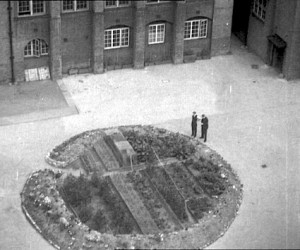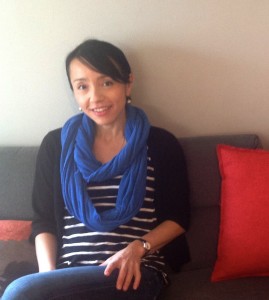
Garden at Westminster Cathedral, London, created from bomb crater, 1942
“Those craters, which introduced me to the pain of life, which taught me about the un-solidness of ground, also became a portal to my becoming a writer.”
~ Kyo Maclear
On the eve of my marriage, in August 1998, my father gave me a beautiful lacquer box with a black and white photo inside. It showed my father from behind peering out over a lunar landscape. Written on the back were the words:
This is a very historic photo of a time of horror and happiness. In September 1969 I traveled from Hanoi to the border with the South — the first television correspondent to do so. What I saw no one in the West at first believed, countryside bombed so totally that it looked like the craters of the Moon. When I returned to Hanoi (traveling at night to hide from the bombing), I vowed I’d do a television history of Vietnam some day to “repair” the damage. That same day in Hanoi I received wonderful news that forever altered my life: a telegram from Mummy saying you were on your way!
My husband thought it was a lovely but strange wedding gift. On the one hand, there was the photo — black marks of bomb impacts on the ground. On the other hand, there was the refined lacquer container, subtly inlaid with mother of pearl, a reminder of my father’s simple and exquisite taste. Devastation and beauty. Horror and happiness. After years of observing my father, however, I didn’t see it as strange at all. Intense maybe, but not — in the out-of-character sort of way — strange.
In the months and years after our wedding, I kept going back to that box. It seemed, in that manner of certain keepsakes, to offer some basic truth: life is a paradox, a combination of contrasting elements.
Do we not all have a box somewhere? The box that goes by different names — identity, the past, childhood — but which speaks to our emotional inheritance?
§
My father has always been drawn to life’s craters. As a war reporter and later a documentary filmmaker, he made a life of doing what most people avoided — he rushed towards disaster. A child of the Blitz, he faced forward when others would have looked or run away.
He chose war because it allowed him to step into a meaningful narrative. He chose war because it was a good story and it held a sense of camaraderie and because he felt he could make a difference. Or maybe he chose war because he saw in the brutal act of fighting a clear-cut expression of the brutal act of living. (In war, someone is always losing something. In war, the strongest survive.)
Not long ago, I read about a documentary called Under Fire: Journalists in Combat. When the filmmaker, Martyn Burke, was asked why he thought his subjects felt compelled to keep putting themselves in harm’s way, he replied that he didn’t know: “none of them ever gave me a real answer that I could hold onto…. There are all the answers that are true — that it’s important, that it brings us news from places we need to know about, that there’s an adrenalin high and more — but there’s this unknowable personal component that’s still floating around in the ether and has not been bottled and examined, and may never be.”
It’s this “unknowable personal component” that continues to fascinate me when I meet people who put themselves in the line of fire. It’s the elusive backstory and motivation, not yet “bottled and examined.” I don’t know if I’ll ever know all the reasons why my father chose war but I do know that the choosing had lasting effects. It sculpted aspects of his personality and certainly shaped his view of human nature. In tacit and unspoken ways, it created a tone and syntax for my childhood.
§
Of course, I did eventually discover that there were people who didn’t see life the way my parents did — that is, shadowed by probable disaster. When we moved to Canada, I became best friends with a girl whose parents were hippies and they behaved as though life were a sunny alfalfa field. They had a pet rat and bred rabbits, which we spun around on a turntable, and they made their own granola. I had never eaten granola before. I had never seen a family do chores together so happily. I suspected my friend’s parents — delighted with life, fearless and unanxious, readers of Sunday morning funnies — were of a different species altogether.
Eventually, I stumbled into homes that had a more familiar quality. As if by magnetic force, I was adopted by the few Jewish families in my neighbourhood. On our quiet WASPy street, it was comforting to align myself with the minority. I suspected that these parents read the world news section first. I recognized the emphasis on education, the quest for excellence, the more-than-average fears (of illness, of loss).
§
My parents did what they could to shield me, to give me some other kind of childhood than the ones they had known. They raised me in Canada, bought me toys and holidays and swimming lessons, and sent me to good schools. My father, who only achieved a grade-school education, put me through university with a passion it took me years to appreciate. He never wanted me to suffer the self-doubts of not having enough education. He wanted me to believe that I could do anything to which I set my mind.
When things were going wrong in my life — when I had been dumped or suffered a loss — it was comforting to be around him. We didn’t speak about things directly but I knew he knew. He knew we all have our emotional wars. We all experience small-scale disasters. A few years ago someone pointed out that my dad seems to thrive in times of crisis. “He really comes through when you need him.” It’s true. I think it’s his empathy but I also think it may have something to do with his notions of newsworthiness. In my father’s worldview, happiness is a non-event. It’s irrelevant. He once joked that only callous, stupid people are happy, and I know, at some level, he believes it. And not just him. Try to talk about happiness with any veteran war reporter and he or she will probably laugh in your face.
§
The bottom line is that I grew up with a great sense of contingency. My father taught me to prepare my mind for the worst. Disaster is always lurking! But he also made me unafraid to enter the unknown. Those craters, which introduced me to the pain of life, which taught me about the un-solidness of ground, also became a portal to my becoming a writer.
A year or two ago, my father, now 83, announced that he was thinking of making another documentary about Vietnam, this one about the Ho Chi Minh Trail. It turns out that war is good for biodiversity because it keeps development away. Four decades after U.S. warplanes plastered the trail with bombs, a remote untouched corner of the trail near Cambodia is now a sanctuary of endangered wildlife. Tigers prowl imperiously down tracks where weapons-laden North Vietnamese trucks once rolled. Elephants shepherd their young past giant bomb craters to drink at jungle watering holes. And rare apes call from treetops that used to hide communist forces from American pilots. Defoliated forests have grown back. In other areas, villagers have transformed the bomb craters into fishponds, micro-lakes filled with groundwater and rainwater that provide sustenance to the Vietnamese people. It will be a story of recovery, he tells me.
The lesson I have learned from my father is that life ceaselessly combines the hard and the soft, ordinary horror and random happiness.
§
My father and I share many things, but above all we share a common trait. Our work is very personal. This is different than saying it’s autobiographical. We have our own ideas about what makes a good story. He has survived without much inclination towards introspection. He is vocally suspicious of psychology. He has a “leave it be” attitude to the past. I am of a generation that believes in picking things up and examining them. We tell ourselves the stories we need in order to live and get on with it. We write because we’re curious. We write to overcome ancient feelings of inferiority or emptiness that might otherwise dog us. We write because it makes us feel alive and possibly even happy.
♦ ♦ ♦
 KYO MACLEAR was born in London, and grew up in Toronto. She is the author of two novels: The Letter Opener and, most recently, Stray Love, both published by HarperCollins Canada. A dual British-Canadian citizen, Kyo is also a visual arts writer and the author of two critically acclaimed children’s books: Spork and Virginia Wolf. Her newest picture book, Mr. Flux, will be published in April.
KYO MACLEAR was born in London, and grew up in Toronto. She is the author of two novels: The Letter Opener and, most recently, Stray Love, both published by HarperCollins Canada. A dual British-Canadian citizen, Kyo is also a visual arts writer and the author of two critically acclaimed children’s books: Spork and Virginia Wolf. Her newest picture book, Mr. Flux, will be published in April.
(The paperback edition of Stray Love was released today, March 19.)
What a touching story!